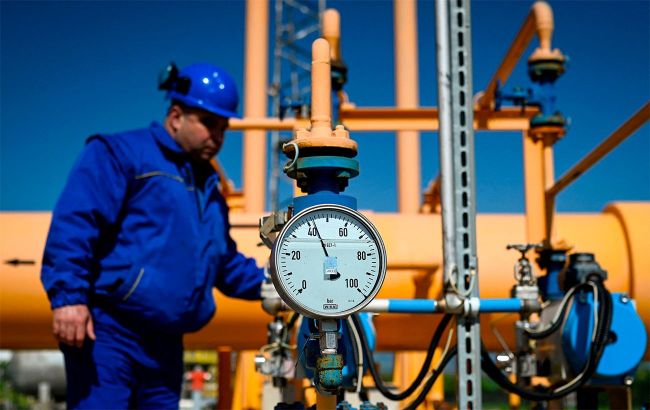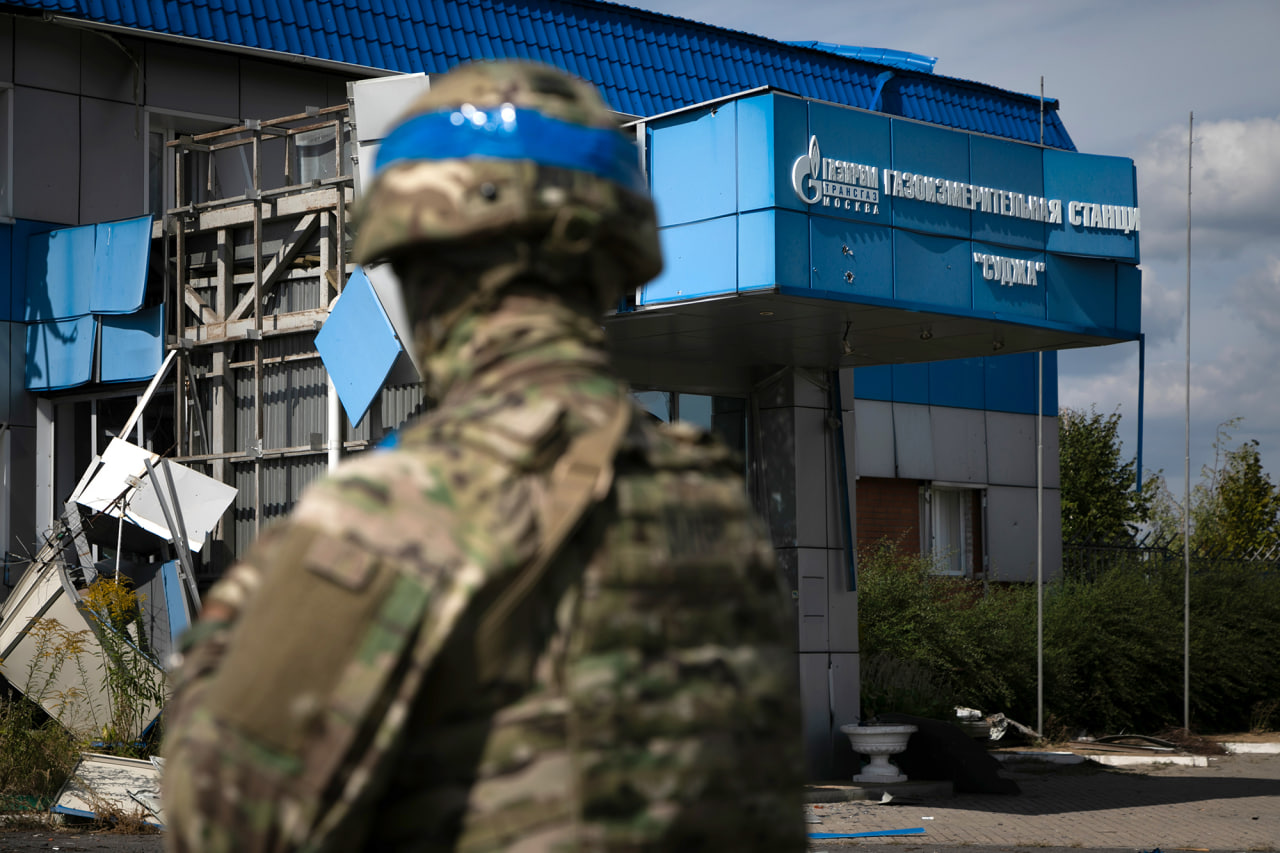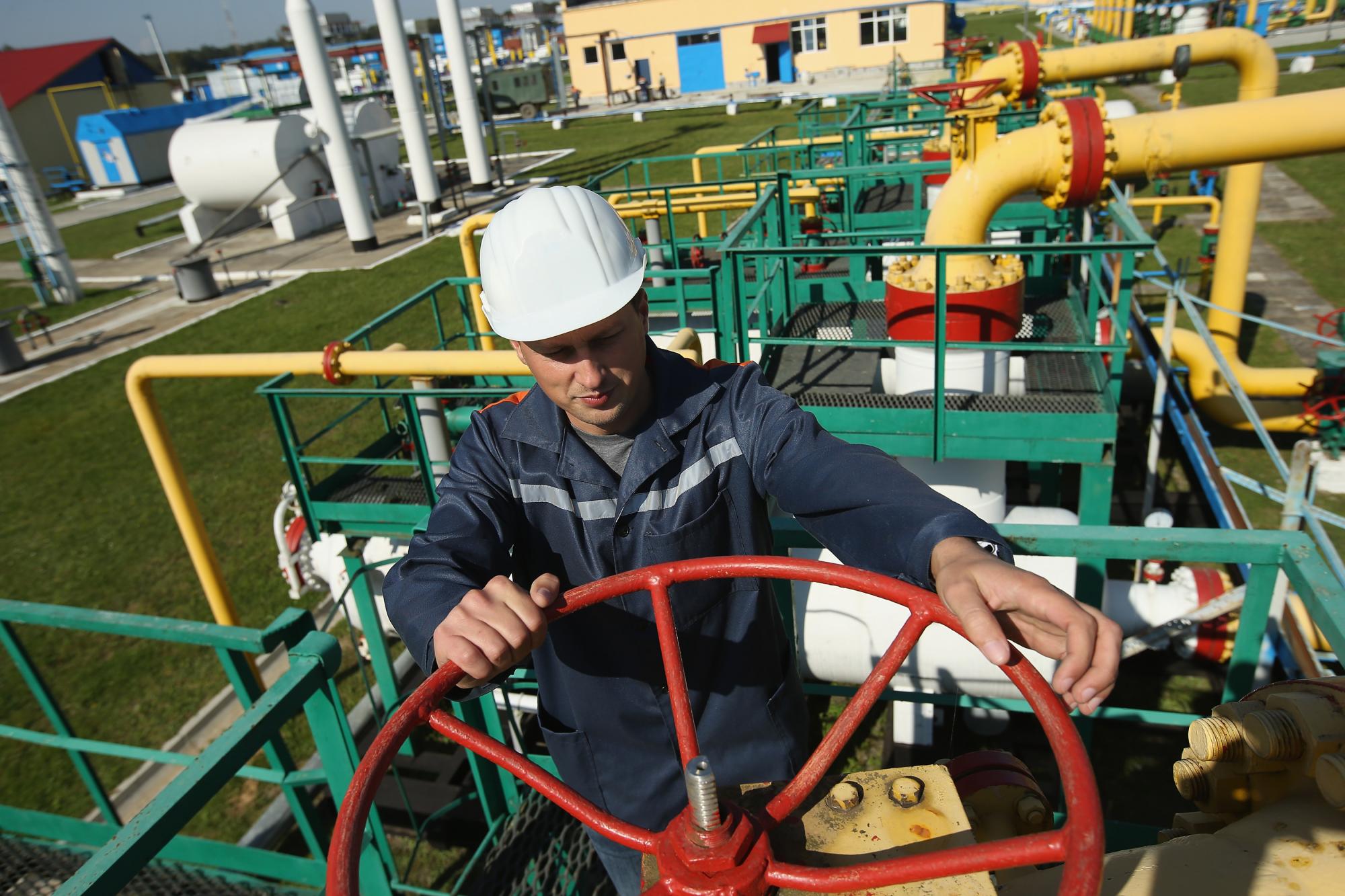Russia aims to maintain gas transit to EU through Ukraine: What’s in it for Putin and Gazprom?
 Russia is trying to preserve gas transit through Ukraine (Photo by Getty Images)
Russia is trying to preserve gas transit through Ukraine (Photo by Getty Images)
Russia continues gas transit to the EU through Ukraine despite losing control of the Sudzha gas compressor station in the Kursk region. Moreover, Moscow seeks to extend the transit into 2025 by involving Azerbaijan. Why does Putin want to maintain transit through Ukraine, and what are the prospects for Moscow's new project with Baku - find out in the material by RBC-Ukraine below.
Contents
- Why the transit hasn't stopped
- What are the risks if gas transit stops
- A new gas transit option
- Where to get gas when it's not available
For nearly two and a half years, despite active hostilities, Ukraine has continued to transit Russian gas to European consumers. However, the supply volume has decreased nearly threefold compared to the contractual agreement. In 2021, about 40 billion cubic meters of gas were delivered to EU countries through Ukraine's gas transmission system, as stipulated by the 2019 agreements. In 2022, the volume dropped to 20.4 billion cubic meters, and in 2023, to 14.6 billion cubic meters.
European consumers decided to gradually phase out Russian gas literally from the first days of Russia’s invasion of Ukraine, aiming to cease its purchase entirely by 2027. However, some EU countries - Hungary, Czechia, Slovakia, Austria, and Italy - still rely on Russian gas.
Since February 2022, gas supplies to the EU through Ukraine have continued regularly. However, in May, Russia provoked a halt in deliveries through the Sokhranovka gas metering station (GMS). The Ukrainian party recorded the unauthorized use of gas, considered the situation a force majeure, and halted transit through this point, offering to transfer the volumes to the Sudzha GMS. Russia did not agree to this, resulting in an overall reduction of transit by almost a third - Sokhranovka had been handling an average of 30 million cubic meters of gas per day.
The Sudzha GMS remained the only entry point for Russian gas. However, on August 6, the town of Sudzha in Russia’s Kursk region was captured by Ukrainian forces, and the GMS came under their control. Despite this, gas transit has not stopped and continues for the third week at volumes similar to those before the operation of the Ukrainian Armed Forces in the Kursk region began. This is confirmed by both the Ukrainian Gas Transmission System Operator and Gazprom. For example, on August 21, transit amounted to 42.4 million cubic meters.
Why the transit hasn't stopped
The situation at the Sudzha GMS could have been seen by Gazprom as a force majeure, gas supplies could have been cut off. However, this did not happen, and there are several reasons for this.
Firstly, stopping the transit would further confirm the seriousness of the situation in the region. For now, Moscow is trying to publicly downplay the advance of Ukrainian forces into Russian territory, treating it as a temporary inconvenience.

The Sudzha gas metering station has come under the control of the Ukrainian military (Getty Images)
Secondly, there are financial losses to consider. Gas transit through Ukraine brings Gazprom about $400 million monthly, a significant sum when the company suffers record losses.
Thirdly, stopping the transit would negatively impact the situation in Slovakia and Hungary, where there are no alternative gas supplies in the necessary volumes or where alternatives are more expensive than Gazprom's gas. These countries remain among Russia's closest allies in the EU, and damaging relations with them would be a significant risk for Russia. Moreover, these countries are already concerned about the potential cessation of oil supplies through Ukraine.
RBC-Ukraine reported that Hungary and Slovakia expressed strong interest in continuing gas transit in March.
In addition to these three reasons, Hennadii Riabtsev, director of the Psychea Center, adds a fourth. He does not rule out that if transit is halted, Gazprom could face sanctions from buyers for failing to fulfill contracts. "In this case, I believe 'force majeure' is unlikely to be accepted as an excuse. After all, until now, the war has not been considered a force majeure situation for Gazprom - transit has been continuing," Riabtsev said in a comment to RBC-Ukraine.
Former head of the Ukrainian Gas Transmission System Operator, Sergiy Makogon, also believes halting transit would lead to arbitration disputes for Gazprom over contract non-fulfillment. "They could face multi-billion dollar lawsuits from gas recipients. Gazprom is obligated to deliver gas to Slovakia or Austria, and if the gas does not reach the EU, the buyers will seek compensation for damages through arbitration. These lawsuits could ultimately destroy Gazprom," Makogon noted.
Another potential reason for stopping the transit could be the failure of the Sudzha station. There are both measuring and compressor equipment at the station.
"If it operates, it means it is not damaged. But if something goes wrong, it would indicate that it is the result of Russian actions, such as shelling of the Ukrainian forces at the station," Riabtsev noted. Currently, there is only information about the destruction of administrative buildings at the station.
If the GMS is damaged to the extent that measurements cannot be taken there, it would not necessarily lead to a halt in transit, according to Riabtsev. "Measurements can be conducted at the point where the gas exits Ukraine," the expert noted.
If the compressor equipment is damaged, gas pressure can be regulated from Ukrainian territory. However, the likelihood of damaging the pipeline itself is quite low since it is buried deep underground.
What are the risks if gas transit stops
Even if we assume that gas transit halts for some reason, there would be no significant consequences for either Ukraine or the EU.
If Gazprom refuses to fulfill its contractual obligations under the "take-or-pay" principle and stops making monthly advance payments, Ukraine could take the case to arbitration.
Ukraine's gas transmission system (GTS) would still be able to operate to supply domestic consumers with gas, even during the winter period. Stress tests have confirmed this capability.
Europe would also not be significantly affected by the reduction in supplies, as Russian transit gas currently accounts for only 5% of the total imports.

Europe will not suffer from the termination of gas transit through Ukraine (Getty Images)
Given the small share of Russian gas, significant price changes are not expected. Notably, after the news that the Sudzha GMS came under Ukrainian control, there was only a slight, short-term, and primarily stress-driven price increase.
"European traders have hardly reacted to the risks of a complete halt in Russian gas transit through Ukraine," said Makogon. This is because the volume of Russian energy resources in the EU market has decreased, there is enough LNG to compensate, and gas storage facilities are already 90% full. Moreover, EU countries that previously depended on Russian gas have found alternative supply routes.
Riabtsev notes that gas prices began to rise slightly a week before Sudzha came under Ukrainian control due to increased demand in Southeast Asia.
Financial losses for Ukraine from the cessation of transit would also be minor, given that the transit contract is unlikely to be renewed after 2025.
With annual payments from Gazprom amounting to around $800 million, halting transit in September, for example, would cost Ukraine approximately $270 million by the end of the year.
A new gas transit option
Another major factor preventing Russia from halting transit is the fear of losing the EU market and, consequently, revenue from energy exports. If transit is interrupted even briefly, gas buyers who have not yet faced serious supply problems will not only turn to arbitration but also actively seek alternative gas supply routes. Currently, Russia not only continues to fulfill contracts with EU partners under near-force majeure conditions but seeks to continue transit through Ukraine after 2024
The Ukrainian party has repeatedly stated that the existing contract with Gazprom will not be renewed. However, there are still possible options for transit. Back in March, RBC-Ukraine reported that an alternative could be for a gas buyer in the EU to purchase Ukrainian GTS capacity and pay the transit fees directly to the GTS Operator.
Now, another gas supply option is being discussed. Formally, this would be Azerbaijani gas, not Russian, which could transit through Ukraine to European consumers.
Negotiations on this issue have already been confirmed by the EU, Azerbaijan, and Ukraine - Volodymyr Zelenskyy mentioned it in July.
Following Vladimir Putin's visit to Azerbaijan, Gazprom announced an agreement with SOCAR to expand diverse strategic partnerships.
The exact details of this partnership were not disclosed. However, most observers interpreted this as an agreement to sell Russian gas to Azerbaijan for delivery to the EU via Ukraine. SOCAR has yet to comment on this issue.
Where to get gas when it's not available
The EU plans to nearly double its gas supply from Azerbaijan to 20 billion cubic meters (up from the current 12 billion), but only by 2027. This was announced by European Commission President Ursula von der Leyen in July. However, these supplies are planned via the Southern Gas Corridor, which runs from Azerbaijan to Italy through Georgia, Turkey, Greece, and Albania. Besides Italy and Greece, Bulgaria, Romania, and Hungary also receive gas through this corridor.
In 2025, the supply through this corridor is expected to increase by only 2 billion cubic meters. This means Azerbaijan will have virtually no surplus gas available for transit through Ukraine. Currently, a scheme is being developed to purchase gas from Russia, which would then be sent through Ukraine as Azerbaijani-owned gas.
This option is quite feasible, though not beneficial for Russia, as Gazprom loses long-term contracts with customers that could last until 2027. A more advantageous scenario for Gazprom would involve an Azerbaijani company acting as an agent on behalf of Gazprom, noted Leonid Unigovskyi, CEO of the consulting firm Naftogazbudinformatika, in a comment to RBC-Ukraine.
He believes that for Russia, it is crucial to maintain contracts with European buyers, some of which are long-term. Therefore, Gazprom needs to find any mechanism to fulfill its obligations. Although the details of the agreements between Gazprom and SOCAR are not disclosed, Unigovskyi suggests that the Russian supplier might propose that the Azerbaijani partner act as a temporary intermediary. "Russians certainly won’t give up their contracts to SOCAR. I think the option under discussion now is for SOCAR to act on behalf of Gazprom and execute the agency agreement. This is entirely possible," Unigovskyi said.
Thus, he believes that if the option of supplying gas to Azerbaijan is accepted by both the EU and Ukraine, Russia will have the opportunity to simultaneously work on expanding other supply channels, including TANAP, the Turkish Stream, and the Trans Adriatic Pipeline. "In other words, the goal might not be to maintain transit through Ukraine in the medium term, but rather to fulfill current contracts while also working on expanding these three routes for gas supplies to Europe for the future," Unigovskyi noted.
He also suggested that Russia might offer financial support for some projects, particularly expanding the Trans Adriatic Pipeline's capacity. "I think Russia is considering Azerbaijan in a broader, more significant strategic context given the current situation, not just as a means to supply the Ukrainian GTS with so-called Azerbaijani gas, but also to a new route for natural gas supplies to Iran and beyond through Azerbaijan’s territorial waters," the expert said.
Ukraine's position on this project is currently unknown. Its participation in discussions has been confirmed, but this does not mean Kyiv has agreed to its implementation.
Sources say there are some nuances regarding the continuation of transit in any form, including economic ones.
The gas transit tariff is undervalued, based on an arbitration settlement under the 2009 transit contract, and calculated from the guaranteed transit volume. In 2024, this volume is 40 billion cubic meters. But in reality, transit is almost three times lower.
The tariff rate will be determined based on the new transit volume, which is still unknown. It can be assumed that this tariff will be quite high and will be formed based on more than just economic parameters.
On the other hand, there is also a political counterargument, which makes the implementation of any transit project currently impossible. For gas supplies, the operators of Ukraine and Russia must sign a technical agreement to organize the process. Without such a document, supply is simply impossible. Since no official documents are currently being signed between Ukraine and Russia, there is no reason to expect this condition to be met.
Moreover, other legal reasons could block the implementation of the so-called "Azerbaijani gas of Russia" project. The agency has information suggesting that the possibility of extending sanctions to certain energy companies cannot be ruled out. If this happens, the implementation of Russia's transit project with Azerbaijan will become significantly more complicated, if not impossible.

